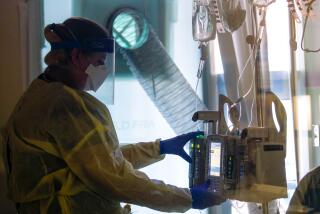E. Coli Soars in Preemies; Strep Drops
- Share via
WASHINGTON — In a boomerang effect apparently caused by antibiotics, E. coli is rising among premature babies and has overtaken strep as the most common infection in such infants, a study published Thursday suggests.
The shift is worrisome because E. coli bacteria can be more deadly than streptococcus germs.
The rate of group B streptococcus blood infections in newborn preemies fell by nearly three-quarters during the 1990s, probably because more women in labor now get antibiotics to keep from passing the bacteria on to their babies during delivery, the study said.
During that same period, the rate of E. coli infections doubled, apparently because ampicillin, the antibiotic commonly used to wipe out strep, gave E. coli room to flourish, the researchers said.
The study was funded by the National Institutes of Health and was published in Thursday’s New England Journal of Medicine. It was led by Dr. Barbara J. Stoll, professor of pediatrics at Emory University School of Medicine.
Group B strep and E. coli are among the bacteria that live harmlessly in many people’s intestinal tracts. If they spread into a woman’s vagina during pregnancy, though, they can overwhelm the newborn’s weak immune system, sometimes causing mental retardation, hearing or vision loss, or death.
NIH scientists and doctors at about a dozen hospitals and medical schools compared 5,447 very low-birth-weight infants born from 1998 through 2000 with 7,606 similar births from 1991 through 1993. Very low birth weight is defined as 3 1/2 pounds or less.
E. coli infections rose from 3 per 1,000 births to 7 per 1,000 births, while group B strep infections dropped from 5.9 per 1,000 births to 1.7 per 1,000 births. The overall rate of sepsis dropped from 19.3 per 1,000 births to 15.4 per 1,000 births.
The researchers studied records on 5,144 babies born at about 170 hospitals around the country.






